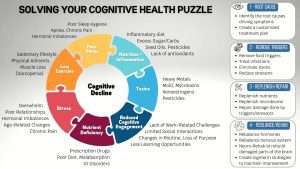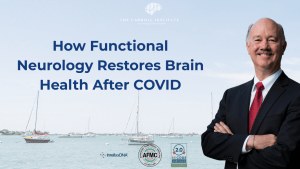How Inflammation and the Immune System Drive Long-COVID Brain Damage
Last updated: October 2025
The Hidden Impact of Long-COVID on the Brain
Most people think of COVID-19 as a respiratory illness, but scientists now know the virus can profoundly affect the brain. For many, recovery from COVID doesn’t end their symptoms. Weeks or months later, they may struggle with memory problems, poor concentration, fatigue, or emotional changes—collectively known as “long-COVID.”
These symptoms often arise because the immune system remains overactive after the infection ends. When this happens, chronic inflammation disrupts the brain’s chemical balance and damages neurons. At The Carroll Institute, we’ve found that understanding and treating this inflammatory response is the key to restoring brain health after COVID.
How Inflammation Affects Brain Function
Inflammation is part of the body’s defense mechanism. Normally, it helps fight infections and repair tissues. However, when inflammation becomes chronic, it causes lasting harm.
In the brain, chronic inflammation interferes with how neurons communicate and damages the protective myelin sheath around nerve fibers. Over time, this leads to slower processing speed, brain fog, and cognitive decline. Studies published in Nature and The Lancet Psychiatry show that even mild infections can lead to measurable gray-matter loss in regions tied to memory and decision-making. In other words, COVID doesn’t just make you tired—it can actually change your brain’s structure.
The Immune System’s Role in Post-COVID Brain Injury
During infection, the immune system releases cytokines—proteins that help fight viruses. But when cytokines stay elevated too long, they can create a “cytokine storm.” This flood of inflammatory chemicals crosses the blood–brain barrier, damages brain cells, and disrupts neural communication.
COVID can also activate microglia, the brain’s immune cells. When overactivated, these cells attack healthy neurons as if they were foreign invaders. This ongoing state of inflammation prevents the brain from healing and rebuilding connections, which explains why some people experience symptoms for months—even when no active virus remains.
Why Chronic Inflammation Damages Memory and Focus
Inflammation affects multiple brain regions, including the hippocampus (memory formation) and the prefrontal cortex (attention and executive function). This is why many post-COVID patients feel foggy, forgetful, or unable to focus on complex tasks.
In severe cases, long-COVID inflammation may accelerate the same processes seen in Alzheimer’s disease. Elevated inflammatory markers such as IL-6 and TNF-alpha—commonly found in post-COVID patients—are also linked to cognitive decline in aging. Addressing inflammation early helps break this cycle and protects long-term brain health.
How We Address Post-COVID Brain Inflammation
Traditional medicine often offers little beyond symptom management. Many are told to “wait it out.” Unfortunately, time alone rarely heals brain inflammation. At The Carroll Institute, Dr. Garland Glenn combines the ReCODE Program with Functional Neurology to reverse post-COVID cognitive decline by targeting root causes and rebuilding function.
Step 1: Comprehensive Testing
- Inflammatory markers (CRP, IL-6, TNF-alpha)
- Hormone and nutrient panels (thyroid, cortisol, vitamin D, B vitamins)
- Insulin resistance and blood sugar markers (fasting insulin, HbA1c, HOMA-IR)
- Mycotoxin and heavy metal screening
- Genetics (e.g., APOE and detox pathways) when appropriate
- Functional Neurology assessments to identify affected brain circuits
Step 2: Calm the Immune System and Reduce Inflammation
Treatment begins with anti-inflammatory nutrition, targeted supplementation, gut support, and detoxification where needed. We also optimize sleep and stress regulation, because both strongly influence inflammatory signaling.
Step 3: Rebuild Brain Pathways with Functional Neurology
Reducing inflammation is only half the solution. To truly heal, the brain must be retrained. Using customized neurological exercises, we stimulate specific underperforming regions and reconnect disrupted networks. This includes visual tracking, balance and coordination work, and sensory–motor integration drills tailored to the individual.
We frequently incorporate photobiomodulation therapy (red/near-infrared light to support blood flow and cellular energy) and neurosensory motor integration tools to accelerate neuroplasticity—the brain’s ability to form new connections.
Step 4: Support Neuroplasticity for Long-Term Recovery
As inflammation settles, consistent, targeted drills strengthen new neural pathways. Over time, patients report clearer thinking, better focus, improved mood, and renewed energy—signs that the brain is truly recovering, not just compensating.
Why This Matters: The Overlap with Alzheimer’s Biology
Post-COVID neuroinflammation shares biological pathways with early cognitive decline: oxidative stress, impaired glucose metabolism, and mitochondrial dysfunction. By addressing these factors with a multi-factor plan—root cause testing, metabolic optimization, detoxification, and brain-specific rehabilitation—we protect cognition now and reduce future risk.
“Inflammation may start the problem, but neuroplasticity finishes the healing. The brain is remarkably resilient when given the right support.”
— Dr. Garland Glenn
References
- Douaud G. et al. SARS-CoV-2 is associated with changes in brain structure. Nature, 2022.
- Taquet M. et al. Six-month neurological and psychiatric outcomes in COVID-19 survivors. The Lancet Psychiatry, 2022.
- Bredesen DE, et al. Sustained Cognitive Improvement in Alzheimer’s Disease Patients Following a Precision Medicine Program. Biomedicines, 2024.
Medically reviewed by: Dr. Garland Glenn, DC, PhD, AFMC (Advanced Functional Medicine Clinician)
The Carroll Institute — Sarasota, FL
Learn about the ReCODE Program · Explore Functional Neurology · Understand Root Causes
Educational content only; not a substitute for personalized medical advice.

Dr. Garland Glenn, DC, PhD, IFM, AFMC
Founder & Clinical Director, The Carroll Institute — Sarasota, FL
Dr. Garland Glenn is a board-certified chiropractic physician and functional medicine practitioner specializing in cognitive health, neurodegeneration, and root-cause medicine. Certified as an AFMC (Advanced Functional Medicine Clinician) and Institute for Functional Medicine (IFM) trained, he has also completed over 500 hours of advanced training in Functional Neurology under Dr. Ted Carrick, founder of the Carrick Institute.
At The Carroll Institute, Dr. Glenn leads Sarasota’s only ReCODE-certified Functional Neurology program, helping patients reverse or prevent cognitive decline through the Bredesen ReCODE Protocol, neuroplasticity exercises, and personalized functional medicine care.
Learn more about his background and approach at About Dr. Garland Glenn.
– schedule now –
free discovery call
To help you get started, we offer a free 20-minute Discovery Phone Consultation. During this call, you will be able to talk with one of our Certified Brain Health Coaches about what going on with you or your loved one and find out if we can help. Please review our FAQs prior to scheduling your free call. We look forward to talking with you soon and helping you Save Your Brain.
(yes, it’s totally free!)



